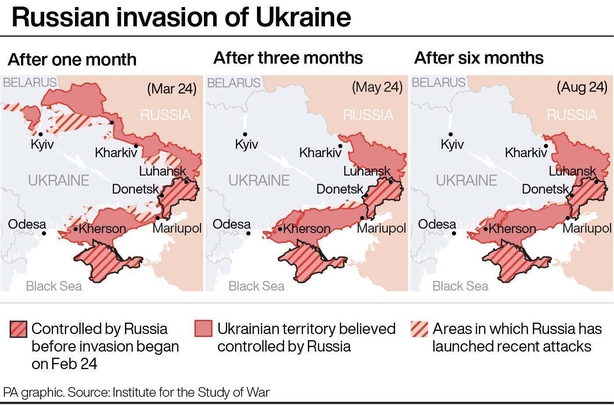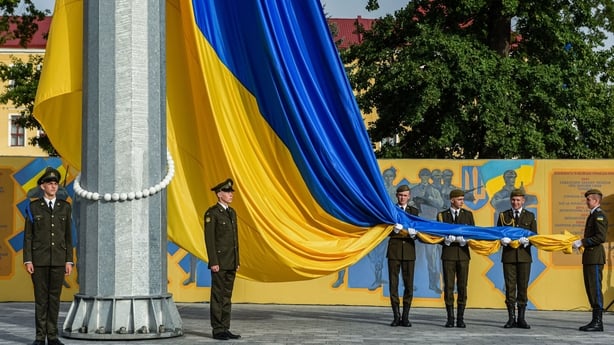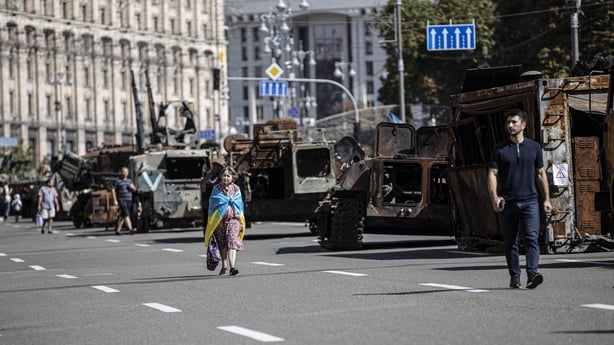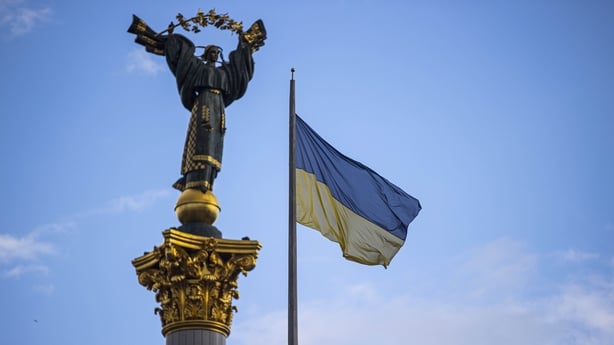At least 22 people have been killed and dozens wounded in a Russian rocket strike on a Ukrainian train station, President Volodymyr Zelensky said, as his nation marked the anniversary of its independence from Soviet rule.
Mr Zelensky warned yesterday of the risk of "repugnant Russian provocations" on Independence Day, which by chance was also six months since Russian forces invaded Ukraine, touching off Europe's most devastating conflict since World War Two.
In a video address to the United Nations Security Council, Mr Zelensky said that the rockets had hit the train in the small town of Chaplyne, about 145 kilometres west of Donetsk.
Mr Zelensky had initially said that at least 15 people were killed and 50 more wounded.
Four carriages were on fire after the strike, he said.
"Chaplyne is our pain today. As of this moment there are 22 dead," Mr Zelensky said in a later evening video address, adding Ukraine would make Russia take responsibility for everything it had done.
"We will without any doubt evict the invaders from our land. No trace of this evil will remain in our free Ukraine."
The Russian defence ministry did not immediately respond to a request for comment.
No public celebrations
Celebrations of the 24 August public holiday were cancelled, but many Ukrainians marked the occasion by wearing embroidered shirts typical of the national dress.
After days of warnings that Moscow could use Independence Day to fire more missiles into major urban centres, the second-biggest city Kharkiv was under curfew, following months of frequent bombardment.
Air raid sirens blared at least seven times in the capital Kyiv during the day though no attacks transpired.
In an emotional speech to compatriots earlier in the day, Mr Zelensky said that Ukraine was "reborn" when Russia invaded six months ago.
He marked 31 years of his country's independence from the Soviet Union with a vow to drive Russian forces out completely.
In an emotional speech, Mr Zelensky said the attack had revived the nation's spirit.
"A new nation appeared in the world on February 24 at four in the morning. It was not born, but reborn. A nation that did not cry, scream or take fright. One that did not flee. Did not give up. And did not forget," he said.
We need your consent to load this rte-player contentWe use rte-player to manage extra content that can set cookies on your device and collect data about your activity. Please review their details and accept them to load the content.Manage Preferences
The 44-year-old leader, speaking in front of Kyiv's central monument to independence in his trademark combat fatigues, vowed to recapture occupied areas of eastern Ukraine as well as the Crimean peninsula, which Russia annexed in 2014.
"We will not sit down at the negotiating table out of fear, with a gun pointed at our heads. For us, the most terrible iron is not missiles, aircraft and tanks, but shackles. Not trenches, but fetters," he said.
He and his wife later attended a service in Kyiv's St Sophia cathedral along with religious leaders from all of Ukraine's major faiths.
In its evening update, Ukraine's army high command said Russian air and missile strikes on military and civilian targets alike continued today.
United Nations Secretary-General Antonio Guterres has called the six-month anniversary a "sad and tragic milestone."
He made the comments during a special meeting of the UN Security Council to mark the anniversary.
Missile strikes far from front lines
Ukrainian forces shot down a Russian drone in the Vinnytsia region while multiple Russian missiles landed in the Khmelnytskyi area, regional authorities said - both west of Kyiv and hundreds of kilometres from front lines.
No damage or casualties were reported, and Reuters could not verify the accounts.
Russia has repeatedly denied its forces are aiming at civilian targets.
Russian Defence Minister Sergei Shoigu told a meeting in Uzbekistan that Moscow had deliberately slowed down what it refers to as its "special military operation" in Ukraine to avoid civilian casualties.
At a UN Security Council session earlier today, Russian Ambassador Vassily Nebenzia reiterated Moscow's rationale for its actions in Ukraine, saying a "special operation" was needed to "denazify and demilitarise" the country to remove "obvious" security threats to Russia.
Moscow's stance has been dismissed by Ukraine and the West as a baseless pretext for an imperialist war of conquest.
'Ukraine will win this war'
Meanwhile British Prime Minister Boris Johnson said Ukraine "can and will win this war" with Russia as he visited Kyiv.
On a surprise visit to Kyiv Mr Johnson also promised a further $63.5 million worth of military support, including 2,000 drones.
Making what is likely to be his last visit to Ukraine before leaving office, Mr Johnson said the UK "will continue to stand with our Ukrainian friends".
He has formed a close bond with Mr Zelensky, and his visit appears intended to demonstrate that the links between the two countries will continue once he has left No 10 Downing Street.
"What happens in Ukraine matters to us all," he said.
"That is why I am in Kyiv today. That is why the UK will continue to stand with our Ukrainian friends. I believe Ukraine can and will win this war."
Russia has made few advances in Ukraine in recent months, after its troops were pushed back from Kyiv in the early weeks of the war.
Ukrainian soldiers on the front line in the east said they were more motivated than their enemy.


Read more
Putin - The Russian leader in six acts
Key moments from six months of war in Ukraine
World economy still feeling impact from conflict
How much longer could the war in Ukraine last?
Europe prepares for a winter without Russian gas
"All of our people are cheering for us. The whole country is, and other countries who help us too. Our fighting spirit is greater than theirs," a soldier told Reuters.
Russian Defence Minister Sergei Shoigu told a meeting of defence ministers in Uzbekistan that Russia had deliberately slowed down what it refers to as its "special military operation" in Ukraine to avoid civilian casualties.
Increasing western support
US President Joe Biden announced nearly $3 billion for weapons and equipment for Ukraine in Washington's "biggest tranche of security assistance to date".
Under Biden, the United States has committed more than $13.5 billion in security assistance to Ukraine.
NATO Secretary General Jens Stoltenberg told Ukrainians they were an inspiration to the world.
"You can count on NATO's support. For as long as it takes," he said in a video message.
Russia has made few advances in recent months after its troops were repelled from Kyiv in the early weeks of the war.
Ukraine's top military intelligence official, Kyrylo Budanov, said Russia's offensive was slowing because of moral and physical fatigue in its ranks and Moscow's "exhausted" resource base.
On the eastern frontlines of Ukrainian resistance and in shattered cities, some with deserted streets under curfew, combatants and civilians marked the holiday with words of resolve and the promise of victory.
Russian forces have seized areas of the south including on the Black Sea and Sea of Azov coasts and large tracts of Luhansk and Donetsk provinces that comprise the eastern Donbas region.
The war has killed thousands of civilians, forced more than a third of Ukraine's 41 million people from their homes, left cities in ruins and shaken the global economy, creating shortages of essential food grains and pushing up energy prices.
Yesterday, Mr Zelensky told representatives of about 60 countries and international organisations attending a virtual summit on Crimea yesterday that Ukraine would drive Russian forces out of the peninsula by any means necessary.

The war is largely at a standstill with no immediate prospect of peace talks.
Almost 9,000 Ukrainian military personnel have been killed in the war, its military said this week.
Russia has not publicised its losses but US intelligence estimates 15,000 killed in what Moscow describes as an operation necessitated by threats to its security.
Ukraine says the invasion is an unprovoked act of imperial aggression.
In the latest assassination of an official installed by Moscow in areas under its control, the head of the town of Mykhailivka in the Russian-controlled part of Zaporizhzhia region, was killed by a car bomb.
On 6 August the deputy head of a town in neighbouring Kherson region was shot dead in his home.
Inside Russia, authorities have set jail terms of five years for anyone referring to its actions in Ukraine as an invasion.
Opposition politician Yevgeny Roizman was shown being detained at his home in a video published on social media this morning, telling reporters he was being arrested "basically for one phrase, 'the invasion of Ukraine'".
Ukraine declared independence from the Soviet Union in August 1991 after a failed putsch by Communist hardliners in Moscow, and its population voted overwhelmingly for independence in a referendum that December.

Both sides have accused the other of firing missiles and artillery at the Russian-occupied Zaporizhzhia nuclear powerplant in southern Ukraine, Europe's biggest, raising fears of a nuclear catastrophe.
International Atomic Energy Agency chief Rafael Grossi said the UN nuclear watchdog hoped to gain access within days if negotiations succeeded. The United Nations has called for the area to be demilitarised.
Ukraine's allies offered more military support, with Norway saying it and Britain would supply micro drones to help with reconnaissance and target identification.
In the latest mysterious fire at a Russian military facility, Russian officials said ammunition stored in the south near the border with Ukraine had spontaneously combusted.
Vyacheslav Gladkov, the governor of Belgorod region, blamed hot weather for the fire, drawing ridicule from Ukraine's defence ministry on Twitter.
"The five main causes of sudden explosions in Russia are: winter, spring, summer, autumn and smoking," it said.

